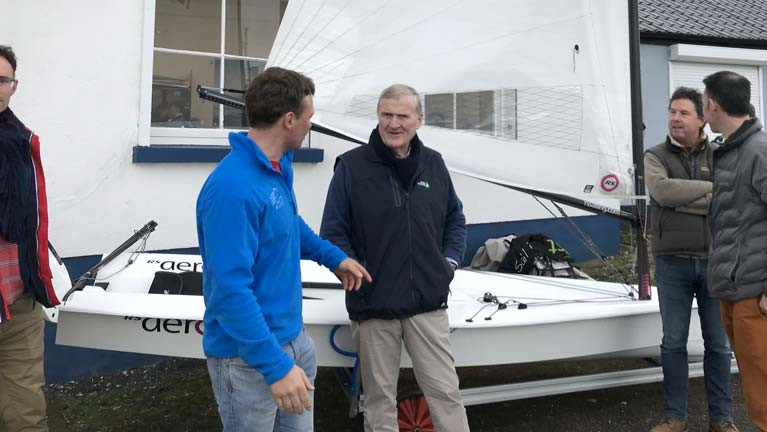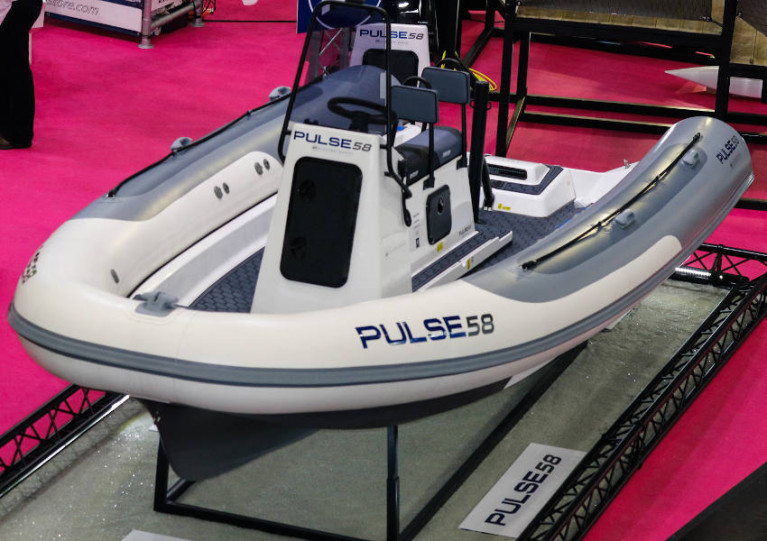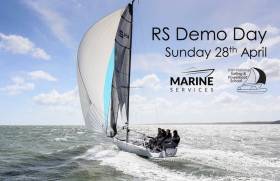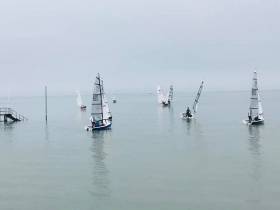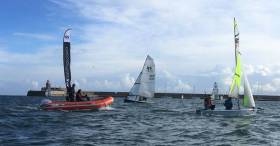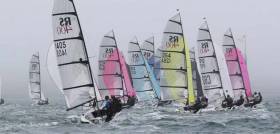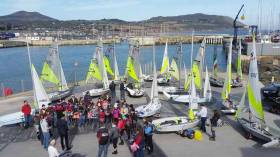Displaying items by tag: RS
48-Strong RS Fleet Ready to Race at Ballyholme
A lively south-westerly forecast for the start today (19th) of the RS event at Ballyholme should give exciting racing in Belfast Lough for the 48-strong fleet.
Racing for the National Championship will be the RS 200s and RS 400s and for the Northern Championship will be the Fevas, Aeros and 2000s.
The event comes hot on the heels of the RS 400 Nationals at East Lothian Yacht Club in Scotland and two Northern Ireland crews who raced there have made it to Ballyholme to take part. They are Paul and Jane McMeekin and William Findlay and Tom McMeekin from Strangford Sailing Club.
Unfortunately, the runners-up in the Nationals at East Lothian, Chris Eames, originally from Strangford Lough YC and crew Rachel Tilley will not be competing in Ballyholme. They were lying first until the last race when on countback, they were pipped by Sam Knight and Chris Bownes.
The Feva class at BYC is showing increased numbers this season, and of these two crews who raced in the UK RS Feva Nationals and more recently the Worlds at Weymouth, Matt & Peter Ridout, Emily & Annabel Ridout, will relish sailing on home waters.
Among the senior contestants in the RS Aero are John and Julia Simms from the host club. John, with Adam Winkelmann and Martin Byrne, were the Royal St George team who came third in the Edinburgh Cup in Falmouth in July.
Given that it seems that some crews leave entering until the last minute, the fleet may well increase to over 50. It is pleasing though that the event has attracted competitors from as far away as Galway, Killaloe, Greystones and Howth as well as from all over the North.
Four RS fleets totalling 25 boats raced the RS Southern Championships at the refurbished Sand Quay at Monkstown Bay Sailing Club in Cork Harbour at the weekend.
“A very successful first regional event of the year for the RS Class and a great way to get back into tactical racing,” said Club Commodore Sandy Rimmington. “Officers of the Day and mark-laying teams did a fantastic job in difficult conditions to give great racing.”
The Monkstown Commodore crewed the winning 400 Class boat which was helmed by MBSC club member Joan Downey.
An MBSC/RCYC combination, Robbie O’Sullivan and Phil McGlade were second and Govan Berridge and David Coleman from Killaloe SC third.
The 200 class winners were Tadgh Donnelly and Meabh Ryan from the National Yacht Club, Dun Laoghaire; Monkstown Bay’s Richie Harrington and Sandy O’Brien were second and Alex and Martin Roe from Galway City SC third.
Aero Class single-handed winner was Daragh Sheridan from Howth YC, with Monkstown’s Robert Howe second and Noel Butler NYC third.
The Fevas Class winners were the St. Mawes SC visitors from Truro, Cornwall, Kitty and Lily O’Halloran. The host club’s Tony Geraghty and Tara Kennedy were second and another MBSC boat third – Afric Barry, Siofra Deasy and Even Barry combining to crew.
Download results below
RS Feva: Raise Both Hands for Two Handed Sailing!
The RS Feva offers a double-handed alternative and stepping stone for young sailors, The world’s leading double-handed dinghy for youngsters and parent/child teams. Exciting performance is the secret behind the success of the RS Feva. The modern styling and practical features make it irresistible. The Fevas have been incredibly successful in getting thousands of sailors on the water.
The Feva is known for its social and competitive class, the design of the boat with mainsail, jib and asymmetric spinnaker allows for sailors to develop their teamwork skills, between helm and crew while also developing their technical skills and boat handling. All while still being an extremely practical boat with a large cockpit allowing space for both parents and children. The Feva is fast, stable, self-draining with a high boom The hull is made of Comptec PE3, which is a state of the art three layer rotomoulding system. The Feva is an extremely low maintenance boat. The optimum weight for the RS Feva is a combined weight of 60-120kg between helm and crew, ideal for children between the ages of 11-15.

Double-handed sailing has so many benefits in comparison to its single-handed competitors, developing skills that lead to a pathway and introduction of crewing that sets young sailors up for a lifelong hobby, with skills that are required in dinghy and yacht sailing. Double-handed sailing offers more flexibility with regard to physique, gender and age combinations, along with the option of being able to split the cost. With a smaller class in comparison to common single-handed boats, it allows far more opportunities for young sailors to grow their skills and their confidence both on and off the water.
The RS Feva has big plans for 2022 with huge support coming for the RIYC, RSGYC, NYC and RCYC with the hope of developing programs to get as many young sailors out racing in Fevas as possible this season. The racing calendar is jam-packed starting with the :
- Southerns in Cork in April,
- Easterns in Dun Laoghaire in June,
- Nationals in Dun Laoghaire in July,
- Inlands in Lough Ree in July,
- Worlds in Weymouth also in July.
- Northerns in Ballyholme in August
- finishing the season with The Autumn Challenge in Dun Laoghaire in October.
There is a huge demand for new Fevas meaning lead times from RS would be at the earliest mid-summer luckily Irish Marine Services currently have stock of Fevas and two more shipments due in before the summer season kicks off.
For more information on anything RS Feva, from price lists and information on events to demo sails and ordering of parts please do not hesitate to contact Heather on [email protected].
Irish Sailing President Jack Roy got proceedings underway at the RS Aero Open Day last Saturday morning. The event was hosted by the Irish National Sailing & Powerboat School in conjunction with the RS Sailing agent in Ireland, Irish National Marine Services and the new class association.
“We were delighted with our first RS Aero Open day hosted by the INSS and Kenny Rumball. Irish Sailing President Jack Roy was very impressed by the boat, Mark Gavin who kindly loaned his boat as a demo had to convince Jack that the boat was in fact six years old so good is the build quality that it looked as good as new.
Kenny Rumball reported that "it was brilliant to see people of all ages trying out the boat from Oppie sailors to lifetime Laser sailors looking for something more rewarding". "All came back in with one thing in common – a smile on their face!", he said. The 5 and 7 rigs proved to be a great hit with people and they loved the instant speed.
The most consistent feedback on the RS Aero was around three areas;
- fun with instant acceleration
- excellent build quality and systems
- stability in strong winds
Brendan Foley, Chairman of the RS Aero Ireland Association said: "We look forward to the class continuing to grow and to seeing lots of new sailors on the water enjoying this truly exceptional dinghy.”
The classes next big outing will be the RS Aero Irish Open, taking place on Saturday 2nd and Sunday 3rd of May, hosted by the Irish National Sailing Club from Dun Laoghaire.
A strong contingent of UK based boats is expected, and there are new boats in stock here in Ireland that will be ready in time for the event.
A short video of some of the action can be seen here. The Irish class already is 17 strong, and off the back of the Open Day, those numbers are expected to rise.
‘Game Changer’ Electric RIB Officially Launched By RS At Boot Düsseldorf
The ‘game changer’ Pulse58 was officially launched at boot Düsseldorf yesterday (Sunday 19 January), and RS joint chief executives Alex Newton Southon and Jon Partridge spoke passionately about the vision for this project and what they have planned for the future.
“We are so proud and excited to have brought the first 100% fully integrated electric production RIB to market — the response at the show has been overwhelmingly positive,” said Southon.
“We felt that it was time for change and to challenge habits, from the conversations we’ve been having around the Pulse58 its so apparent we’re not the only people that think it’s important.”
During the launch, Southon, who is technical CEO of RS, talked through the innovative technology used for the 100% electronic RIB and the hydrodynamic design as previously outlined on Afloat.ie.
From initial design, manufacturing and distribution, RS says the Pulse58 is the product of two years of development and has been packed full of sustainable credentials that compliment its zero-emissions propulsion.
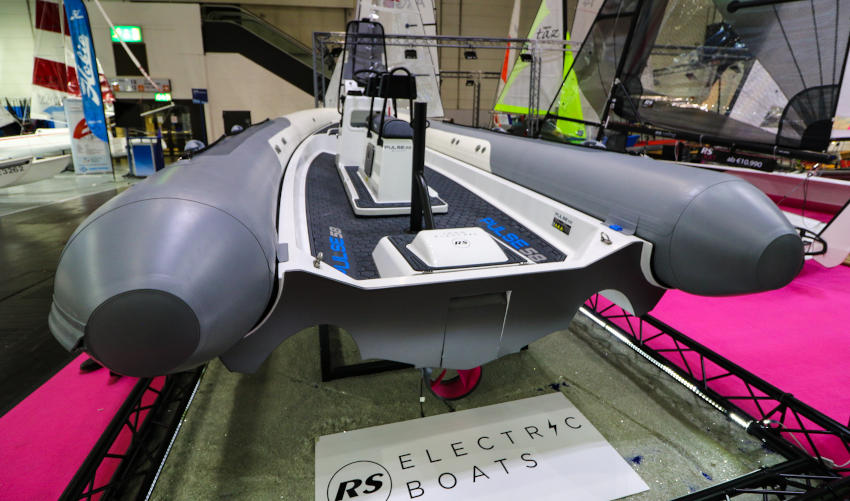
This is only the beginning for the sister brand of RS Sailing, with a Pulse42 currently in development and talk of a commercial workboat and superyacht tenders showing the electric is not just limited to the leisure and coaching market.
South went on to thank RAD Propulsion, Hyperdrive, Hypermotive, Jo Richards, Clive Johnson, Raymarine, Marine360 and Tree Aid for all their work in the project.
Partridge added: “RS was born 25 years ago with the dream of changing how people race and enjoy small boats. Our motivations and dreams haven’t changed.
“With the Pulse58 we want people to enjoy the water in a completely new way — we want to reduce the amount of pollution in our waters and enjoy our playing field for a lot longer to come.”
Alongside the launch, RSelectricboats.com has gone live where you can find further information about the Pulse58, the technology behind it and ways to get in touch.
RS Demo Day At INSS In Dun Laoghaire This Sunday
As previously reported on Afloat.ie, Irish National Marine Services are hosting a demonstration day for the RS Sailing range at the Irish National Sailing & Powerboat School in Dun Laoghaire this Sunday 28 April.
Included in the line-up will be the new RS21 keelboat, with opportunities to get sailing on the exciting design.
There’ll also be a selection of RS Sailing’s training fleet of RS Quests and RS Zests, while a demo RS Aero will be on the water for trials.
Time slots will be managed by the INSS office to ensure everyone gets out on their chosen boat for a test sail of between 60 and 90 minutes. For more details see the Facebook event page HERE.
Full changing and clubhouse facilities will be provided by the INSS ashore, and RS Sailing agent Kenneth Rumball will be afloat to chat about the boats and help out with the demos.
Ahead of the demonstration day, the RS21 will sail to Greystones tomorrow afternoon (Saturday 27 April) to coincide with the RS Easterns at Greystones Sailing Club.
The Second round of RS400 Frosties kicked off as the Spring kicked off on Sunday 24-Feb at the Royal North of Ireland Yacht Club. This event followed the Autumn Series which had some 25 boats racing and very close competition right to the very last race to choose a winner.
Results downloadable below.
This series has so far up to 17 entries entered including one local helm now flying in from UK for the first weekend back on Sun 24-Feb. However, as the picture shows it started with little or no wind on the water. This did not deter the Committee boat though who launched as they normally do and wondered why on earth the fleet were doing so much tacking/gybing practice in synchronization very slowly towards them. The real reason was due to the nature of very fickle on/off wind shifting 30-50degrees every minute all the way out.
Eventually, when the fleet got there it settled a little however even the first start was a struggle to get off the line with pockets of breeze. At the windward Stephen McL/Ryan lead followed by the new black ship of Vaughan cousins Ross/Andrew and Barry McC/Andrew. The wind clocked right and a gust came in which made reversed these placings by bottom mark and in the end Barry McC won deny the Vaughan’s new boat a first race win after late charge and Stephen McL in 3rd.
Due to the wind change staying right, the course was relaid and although still v shifty was at least a Windward/leeward course. This time Barry McC/Andrew pulled away from the start to win with a handy lead with another newcomer Ruan O’T/Kat in 2nd and Tom P/Rory in 3rd. Notable performance form Brian Holmes who was 2nd most of way round but got caught out by a gust from other side last downwind but still came in 4th.
3rd race of day again still v shifty and R400 professional Liam D/Rick showed the way in this one to win 3rd race on 1st day just like in Series1 followed by Paul R/S with great performance in 2nd and Helmsman champs Peter K/Stephen in 3rd.
The next week for Day 2 on 3rd Mar the fleet hoped for more steady winds however that is anything how it turned out with more snakes & ladders racing with light/shifty winds again the state of play.
Race 4 and 5 resembled each other slightly with 40deg left shift at starts causing carnage down the pin-end and many top boats caught out further down pan at times. Race 1 included a 180-deg shift on 2nd lap but still allowed Stephen McL/Ryan to win leading from start with Sam P/Sharon (missing the first week) coming in 2nd and Barry McC/Andrew recovering to 3rd.
In race 5 Trev D’Arcy/Ginge bullied their way off the pin-end best to win the race with Stephen McL/Ryan staying steady in 2nd and the famous Dr Cheyne standing in with Stephen K for 3rd.
Race 6 the fleet got away more cleanly and this time Ed Cody lead at windward after picking a nice gust on the right with a lot of boats stranded left. Barry McC/Andrew followed and gybe-set to overtake staying in pressure and as race was shortened in end they ended in 1st with Sam P/Sharon keeping most consistent in 2nd and Tom P/Rory in 3rd.
Racing starts each Sunday at 1 or depending on rugby and Race officer dinner reservation plans and runs for a total of eight weeks with the last on 14-April.
INSC RS Dinghy Super Series Continues at Dun Laoghaire
The Irish National Sailing Club (INSC) RS Super Series continues this Saturday the 15th of December in Dun Laoghaire Harbour.
This being the last series of races before Christmas, INSC will have Mince Pies and Mulled Wine after sailing.
INSC have a diverse range of the RS fleet racing with Feva’s, 200’s, 400’s Quest’s and this week we hope to have multiple Aero’s and also RS Zests.
Irish RS Agent Kenneth Rumball will be on site all day to answer any questions and also give people the opportunity to put in last minute orders for Christmas.
Available every weekend are demo boats of most of the RS fleet for anybody to try out. For further information, contact [email protected]
Full information on the series is available here
Cork Harbour Duo Win RS400 Northerns at County Antrim Yacht Club
The 2018 RS season of 2018 kicked off over the weekend of 7/8 April with County Antrim Yacht Club (CAYC) hosting the Northern Championships for RS400s/200s/Fevas.
In total there was 35 boats entered and 70 sailors for the event from all corners of Ireland with numerous from as far as Cork so the anticipation for first event of year was high after the RS off-season.
Conditions for the weekend was to prove a mixed bag of glass like conditions so postponements onshore allowing time for extra boat tinkering and good craic among sailors. Soon enough the wind filled in to send fleet out and after a bit more waiting around a cold breeze came in from the sea around 3.30pm allowing for 3 races to happen for all fleets. In the 400s fleet king Al-Bar proved he hadn't slowed over the winter with an emphatic first race win over the fleet. The 2nd race was won right at the finish by Flipper overhauling the other Barry (this time Mac) and 3rd race won by the runaway off the pin end at start by Alan Ruigrok. Scores were very tight with a point to separate top 3 overnight and just 5 points separating 4th-10th proved how close the racing was in this fleet. In the 200s the home team Jocelyn Hill/Katie Kane stole the show with 3 bullets and in the Fevas another CAYC Boat the Corbett brothers lead overnight.
"In total there was 35 boats entered and 70 sailors for the event from all corners of Ireland"
A long day on water ended coming ashore at 6.45pm from racing, and for those interested even sacrificing majority of the Manchester derby. All more than enjoyed the soups on offer and the fleet enjoyed a great dinner spread and evening entertainment with music and much cheaper than over the border drink on offer until the early hours.
Day 2 lead to another postponement while wind decided to dance around in the sky, but the fleet launched bar a few of the top half of the 400 fleet staying ashore watching from 100m off the shore. However the wind gods did play ball around 2pm just as patience was running out allowing time for 2 races to decide the championship. Most of those boats onshore made it out including Alex Barry who after picking a few off added another 1 to his card to put himself in driving seat ahead of Barry McC in 2nd, Alan Ruigrok 3rd. The last race with championship still open Alex Barry got better off Barry McC off start to be in control to win it while Gareth Flanagan got away best of all to win the final race and in the end pip 2nd place overall. 3rd then was Barry McC, 4th Paul McL putting in consistent results ahead of Alan Ruigrok in 5th. The 200s again Jocelyn/Katie added 2 more wins to make a perfect scorecard and take a triumphant win for the home Club. The Fevas had every boat at least once win a race but in end Elysia O'leary/Lily Dwyer won.
Results downloadable below.
17 Fevas For Greystones Sailing Club Coaching Session
17 RS Feva dinghies participated in the latest round of coaching for the class at Greystones Sailing Club at the weekend writes Garett Donnelly. Conditions were perfect with coaching provided for all the sailors ranging in age from 11 to 17 years of age.
Sailors from Greystones, RStGYC, RIYC, Bray SC, Malahide YC and Howth YC took part.
Next up on the Feva 2017 calendar is coaching in Malahide Yacht Club from 8th to 10th April and then Howth Yacht Club for coaching on 19,20,21.
The Eastern Championships follow on 22 and 23 April. Entry for the Easterns is here.


























